OpenCart vs Shopify: Which One Is Best for Your Business?
OpenCart vs Shopify, which one is better?
OpenCart is one of the best solutions when it comes to an open-source eCommerce platform, while Shopify holds the top position among hosted solutions. Choosing the right platform for your business can be challenging since each has its own strengths, weaknesses, and purposes.
To help you make a good decision, this article will show you everything you need to grab a solid overview as well as valuable comparisons between OpenCart vs Shopify. Keep reading to get:
- What is OpenCart vs Shopify
- Detailed comparison: Price, SEO, apps, add-on, ease of use…
- OpenCart vs Shopify: Which one is more optimal?
Need Help to Migrate Your Store?
If you intend to switch platforms, LitExtension offers a great migration service that helps you transfer your data from the current eCommerce platform to a new one accurately and painlessly with utmost security.
OpenCart vs Shopify – Overview
#1. What is OpenCart?
OpenCart is a popular eCommerce solution for small to medium-sized businesses. This platform is also well known for its multiple stores’ management system along with its comprehensive and user-friendly interface. Besides, OpenCart has a wide range of features that enable you to build a unique store that fits all of your specific needs.
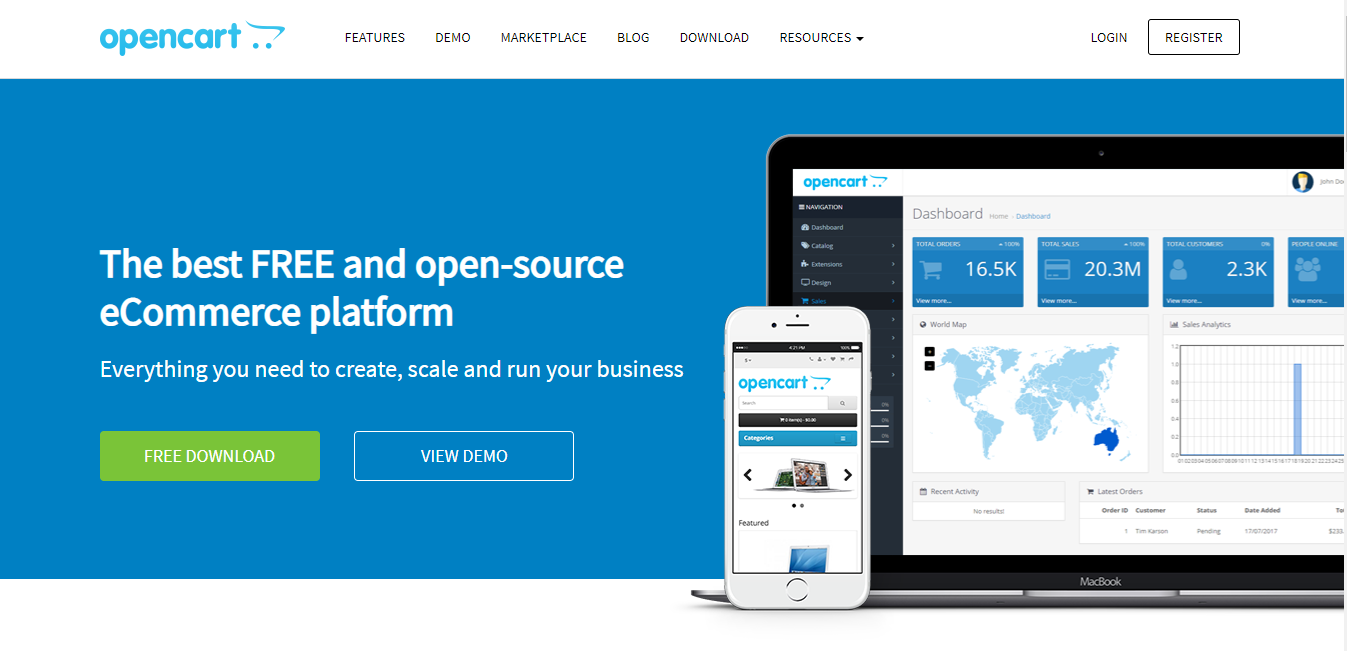
According to BuiltWith, OpenCart has more than 260,000 live websites. Also, it is ranked 5th among all the open-source website builders.
#2. What is Shopify?
Shopify is one of the leading hosted-cart solutions with 4.6+ million active sites. The platform is optimized for all kinds of businesses, from small to large scale.

Being a SaaS (Software-as-a-service) eCommerce solution, Shopify is famous for its ease of use. It grants users a powerful tool to create a new, fully functioning store without a hitch, along with extensive SEO and marketing features.
You might also be interested in reading:
OpenCart vs Shopify: Detailed Comparison
A quick look: OpenCart vs Shopify is fundamentally different.
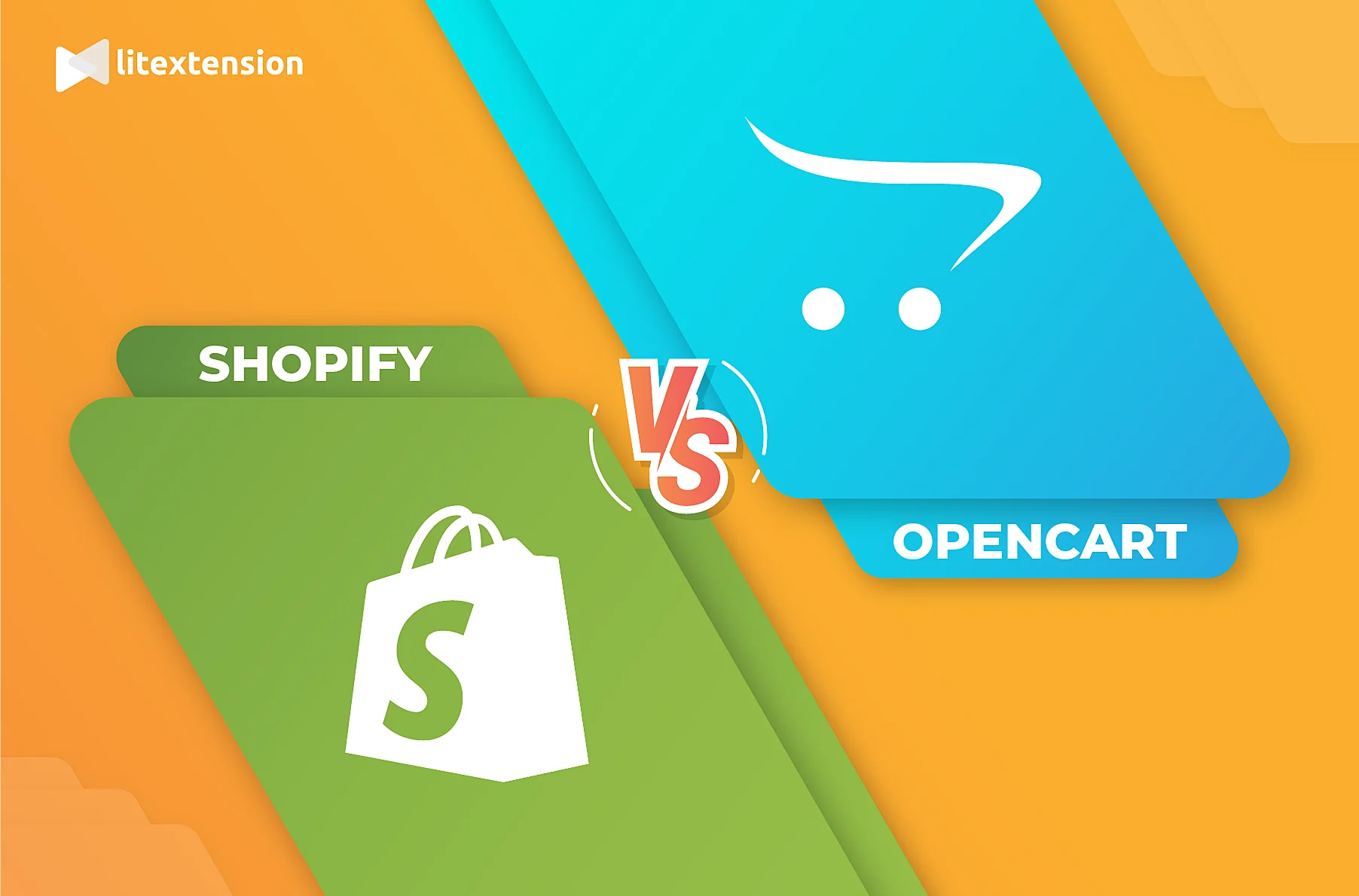
An open-source eCommerce website builder such as OpenCart enables the user to freely access and modify the source code. As a result, you can fully control your website back-end and get unlimited customization possibilities over the design or functionality of your store. However, this type of builder requires a certain level of technical knowledge and coding skills.
In contrast, Shopify is a hosted cart which means it offers you a subscription-based model. Consequently, you don’t need to worry about any issues with creating or maintaining your site. Although users can easily create a new page in just a few clicks without the need for tech knowledge, it will be hard for you to make any adjustments to your website due to the proprietary codebase.
Now, let’s get into the details.
#1. Pricing
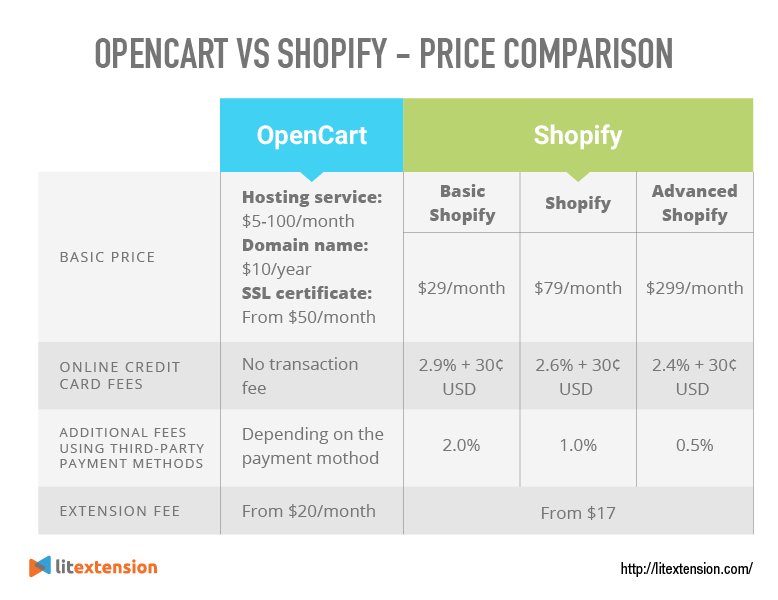
OpenCart Pricing
Thanks to its open-source nature, OpenCart is free to download and install. Nevertheless, you still need to cover some additional costs to get a complete store running, such as hosting, a domain name, and an SSL certificate.
Let’s break them down a bit:
- Hosting service: $5-100/month
- Domain name: $10/year
- SSL certificate: from $50/month
What’s more, you may encounter some transaction fees or additional extension costs (which may start from $20/month).
Shopify Pricing
On the other hand, Shopify offers users 5 pricing plans:
- Starter: $5/month
- Shopify Basic (starting a new business): $39/month ($29/month if paid annually)
- Shopify plan (for a growing business): $109/month ($79/month if paid annually)
- Advanced Shopify (for large-scale business): $399/month ($399/month if paid annually)
- Shopify Plus: start from $2,000/month
Besides, there will be some additional fees associated, such as domain name or transaction fees.
The verdict: It’s difficult to determine the winner of this first round as the choice may depend on whether you prefer a hosted or open-source solution. Let’s continue reading to find the optimal option.
#2. Ease of Use
OpenCart Ease of Use
OpenCart requires coding skills to set up a completely new store. Basically, you are going to follow these stages:
- Purchase a new domain and hosting
- Create a database using open-source administration (DataGrip, Dbeaver, Phpmyadmin…)
- Install OpenCart
- Complete your store setting
Next, you can follow 7 steps in our OpenCart tutorial to set up a successful online store seamlessly.
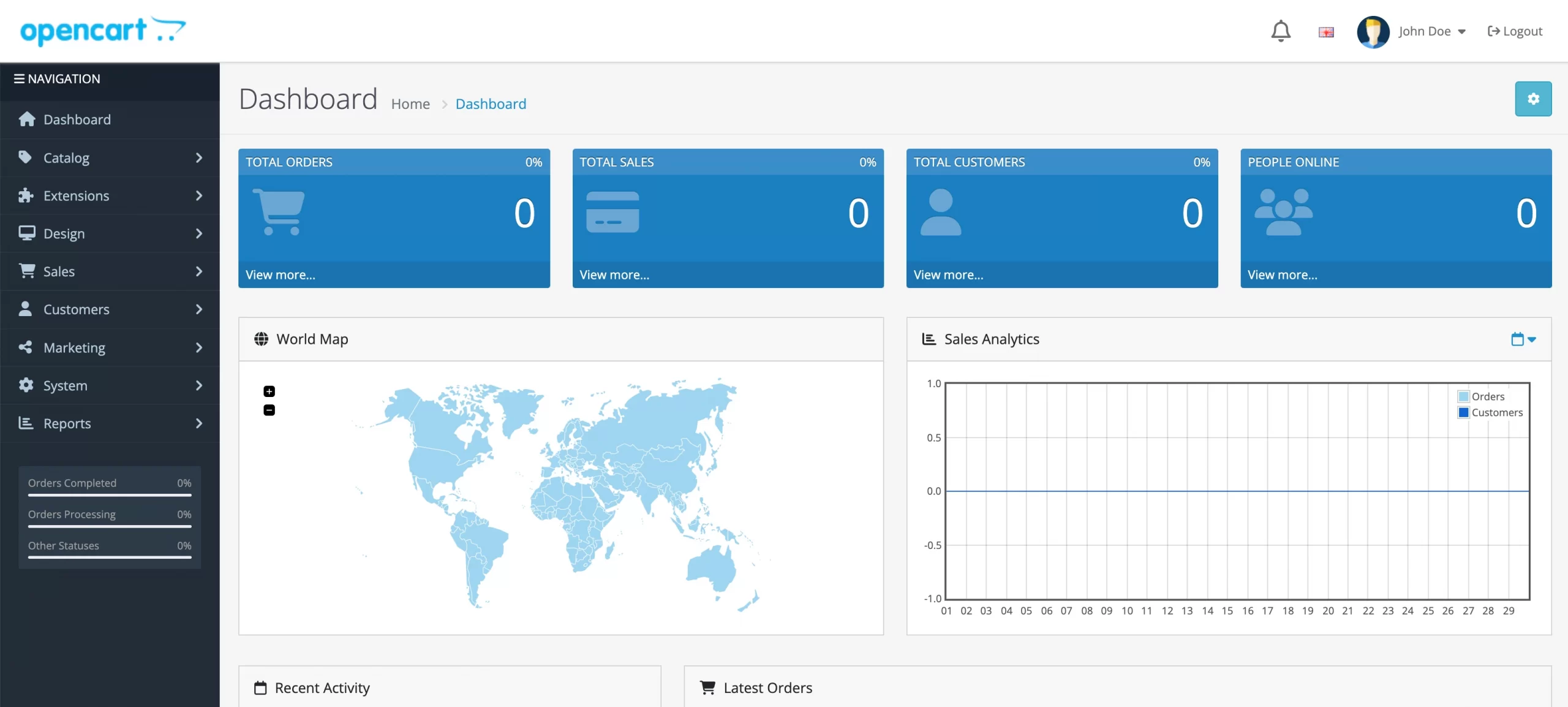
Thanks to its intuitive and convenient interface, you can easily navigate and modify any part of your site.
Here is a review from an OpenCart user:
I’ve tried nearly every cart/e-commerce system available and Opencart is my preferred choice. Written in PHP in a MVC(L) structure, Opencarts layout and system are very easy to understand and build on.
Dave H., OpenCart G2 Review.
Shopify Ease of Use
The largest gap between OpenCart vs Shopify regarding ease of use is technical skills.
With Shopify, you don’t need a line of code to create and manage your store. Starting to create your new Shopify store by providing some of your info such as email, address, store name
You don’t even need to fill in any of your payment information. From the dashboard – your control room, you can test, organize, manage, and modify the layout, color, text, and so on of your online store.
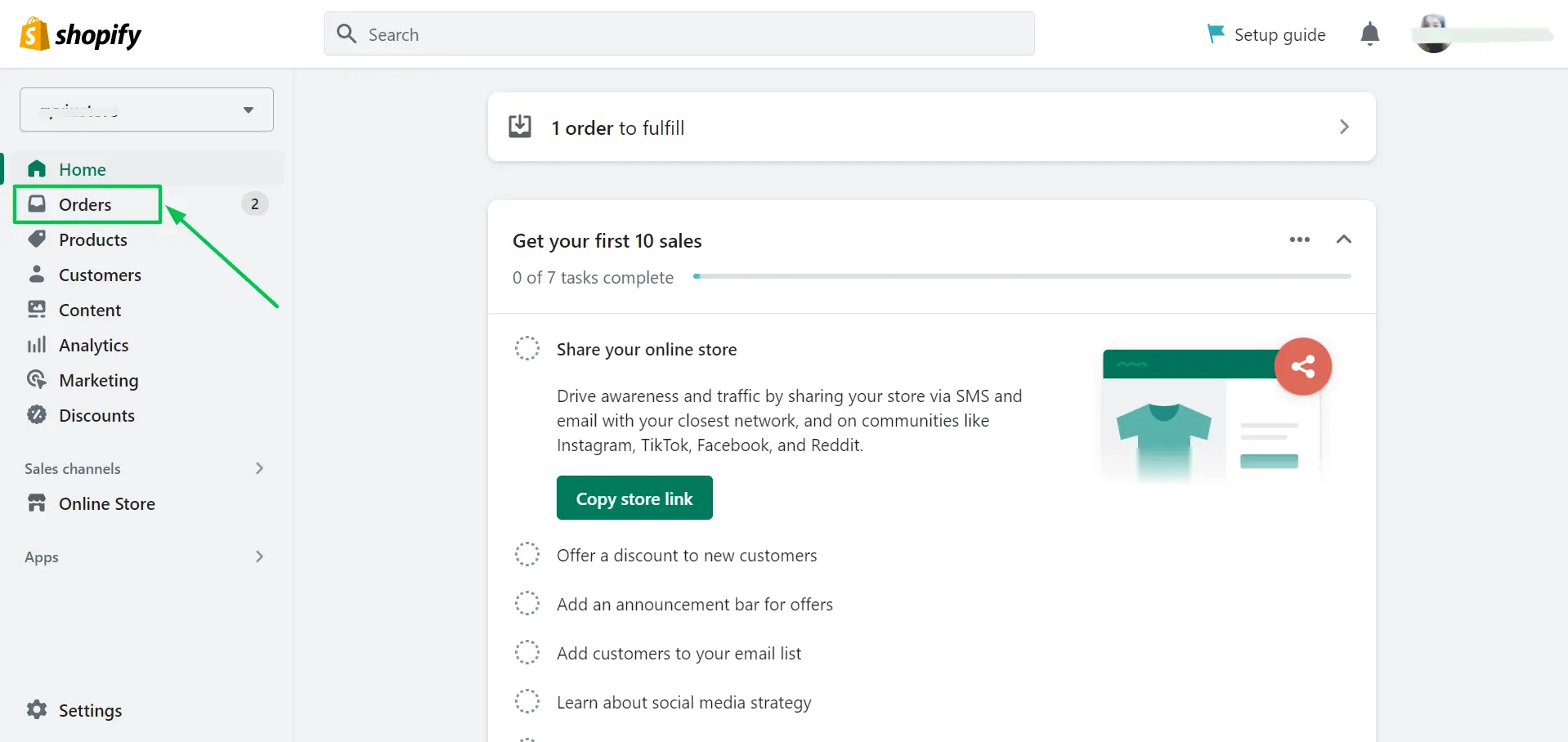
LitExtension also provides you with a vivid tutorial that can help you set up your Shopify store within 10 minutes:
The verdict: Shopify is the winner of the ease of use round in the light of the effortlessly installing process as well as the friendly management system. OpenCart is more complicated to set up because you’ll need basic technical knowledge of hosting, FTPs, security updates, and the like.
Want to Migrate Your Store and Grow on Shopify?
Having decided that OpenCart is not the perfect fit for your online business? Switch to Shopify now and rock your sales with powerful eCommerce functionalities and an extensive selection of website templates with this platform.
#3. Design & Themes
OpenCart Design
OpenCart offers 500 themes, both free and paid (from $60 to $70), and all of them are attractive and fashionable. Some excellent OpenCart themes that are well worth heeding are Journal, Shoppica, Sellya…
However, you should be aware that OpenCart may fall short behind other competitors since the template is not really supported. We find that this platform should be improved to match competitors that offer wider plugin support and better page builders.
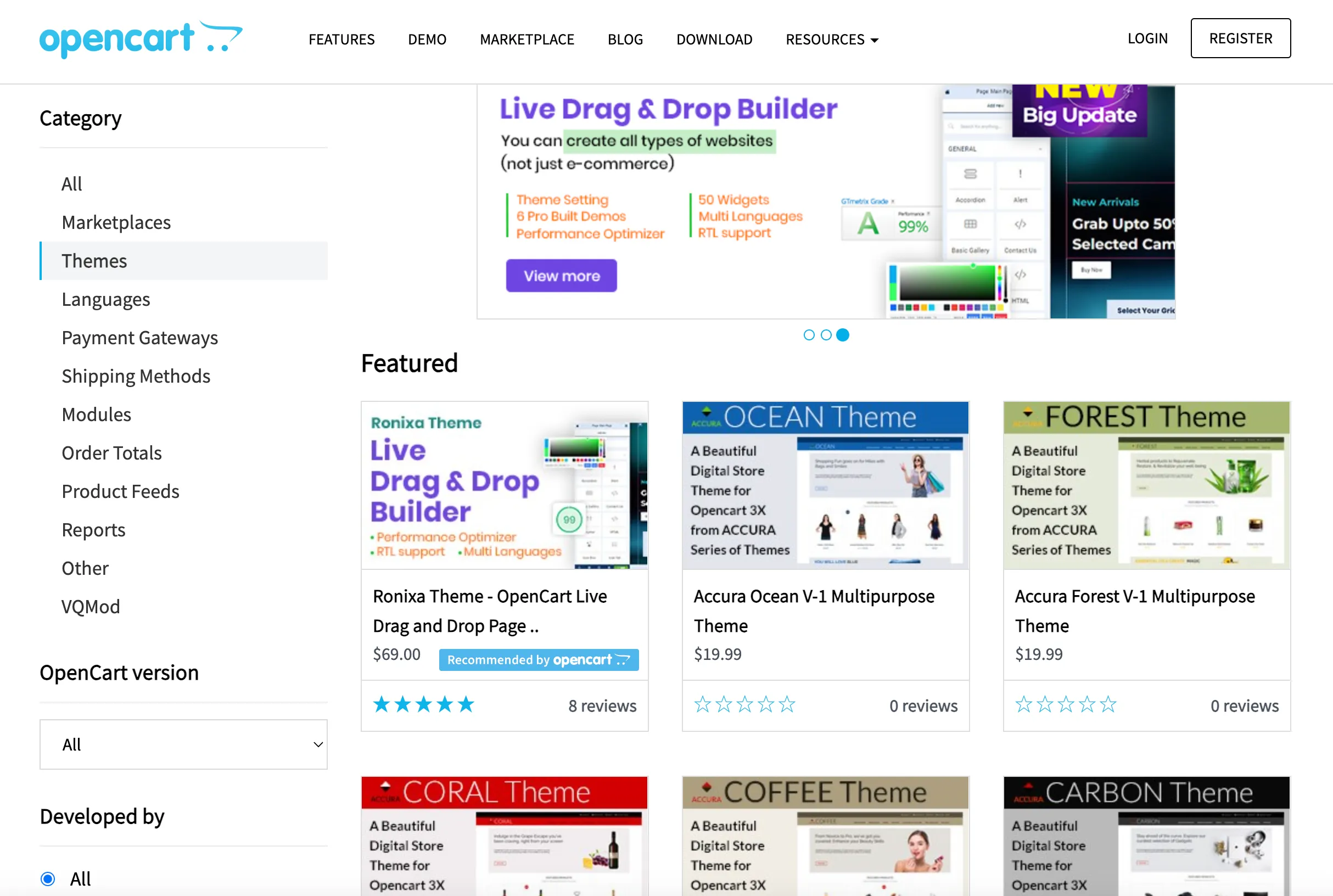
However, OpenCart allows you to modify any component of your website, and the template is not exceptional. If you are confident with your skill in HTML, CSS, or PHP code, you can always tweak the design to make yourself an outstanding, highly interactive look for your store.
OpenCart’s admin dashboard is a big plus, the administrator can customize the front store. This includes editing product positions, disabling categories, updating prices and descriptions, and uploading banners.
Shopify Themes
Shopify Theme Store contains over 180+ free and premium professional, eye-catching, and mobile-responsive eCommerce website templates you can use for your online store. Check out the 30+ best Shopify themes for your shop.

There are two main ways to edit your template. Shopify users can easily customize the template (colors, fonts, or social media buttons, and so on) without using a line of code. You can navigate to the theme editor and adjust your theme directly at the front end. The theme editor includes a theme preview and a toolbar that you can use to add and remove content, and to make changes to your settings.
You can also go the extra mile by using Liquid – Shopify’s Templating Language to interact with the HTML, CSS, and JavaScript of your theme. This way, you can implement even detailed changes in your design and give your store an exclusive appearance.
The verdict: In terms of theme, OpenCart vs Shopify is a tie. Both platforms are equally great when it comes to theme and customization.
#4. Store Management
OpenCart Store Management
Thanks to OpenCart’s open-source nature, e-merchants can effectively manage the store from orders, payment, and shipping to inventory and human resources via the admin dashboard.
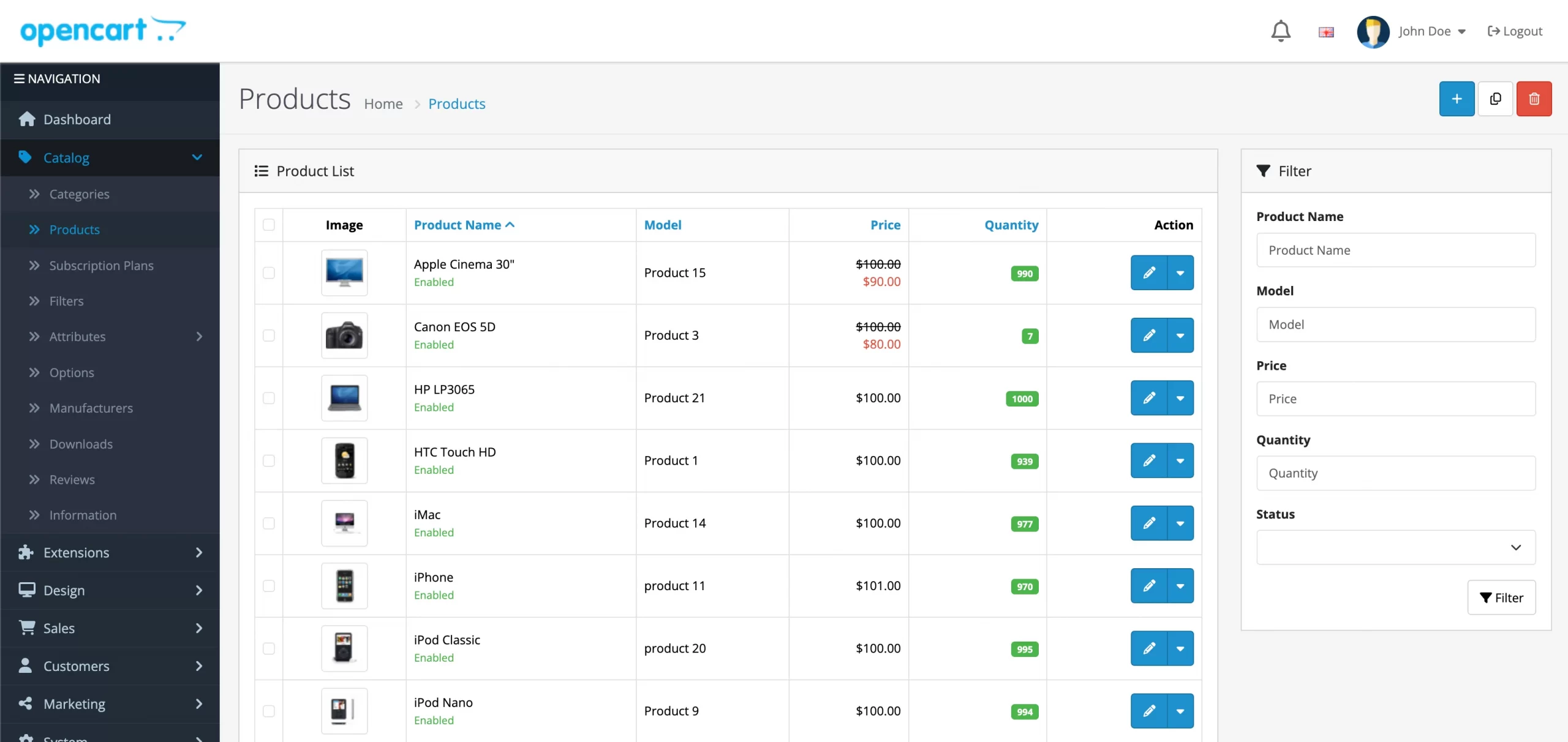
Or else, all of the cutting-edge solutions are right at your fingertips on OpenCart Marketplace. Just choose the category you need, and filter the proper version, developers, and rating to get exactly what you need for your store’s perfection.
Don’t forget to read other users’ reviews to avoid scams, malware, or incomplete modules.
Shopify Store Management
Shopify comes with a full pack of powerful functions and services.
You can easily manage orders and fulfillment, accept payment and get paid quickly, track your store’s sales, and effortlessly boost it with a built-in analytics tool.
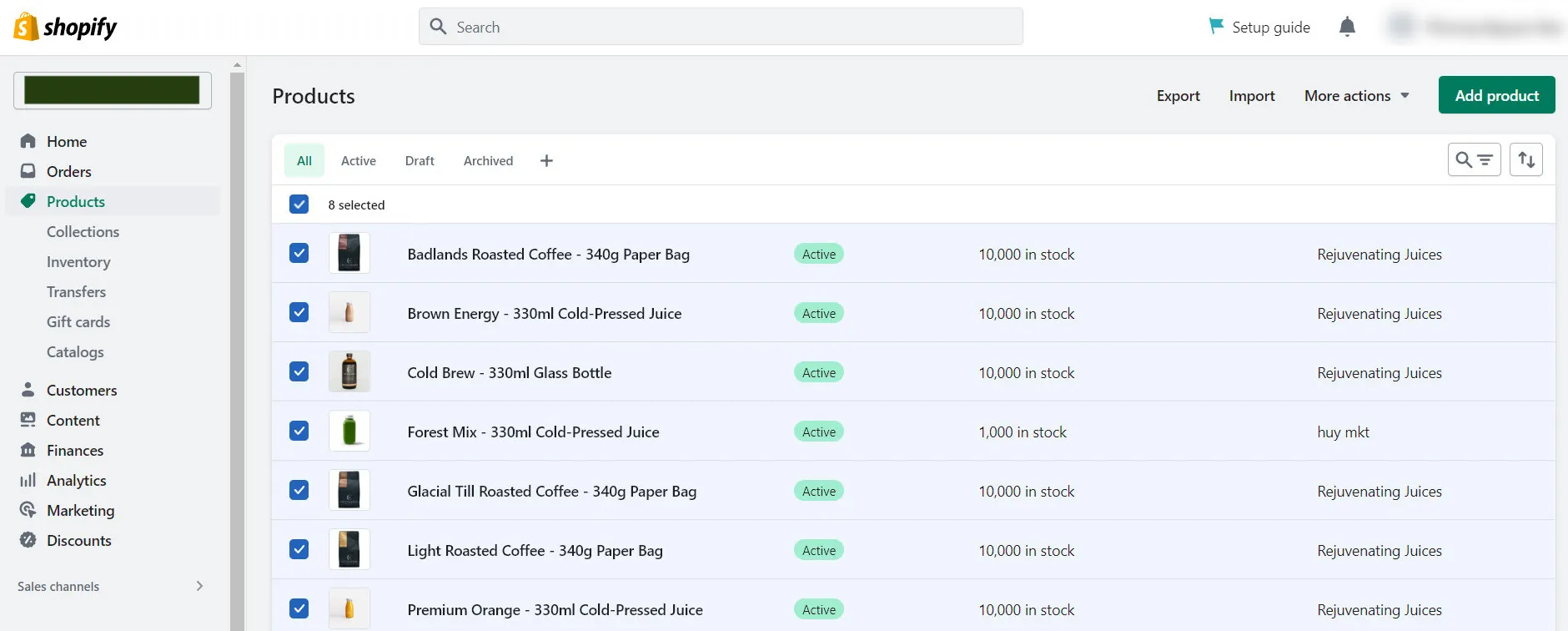
With Shopify, a full-fledged store can be nicely managed on your computer and phone. Shopify also allows you to control your cyber-based business anywhere, anytime with Shopify mobile app.

Simply download it from the app store on both Android and iOS devices.
The verdict: Shopify truly outshines its rival, OpenCart in terms of store management.
#5. Extensions & Apps
Using extensions and tools can bring significant value to your store, as they can make it more convenient and take a lot of work off of your shoulders. If you’re considering OpenCart vs Shopify, which one has a better selection of apps and add-ons? Let’s compare and find out!
OpenCart Extensions
OpenCart is also a really good option for apps and add-ons, with over 14,000 extensions (product feeds, reports, shipping methods, and payment gateways…) available on the OpenCart Extension Store. Also, the OpenCart developer community has made it easy for you to customize your store at a low cost.
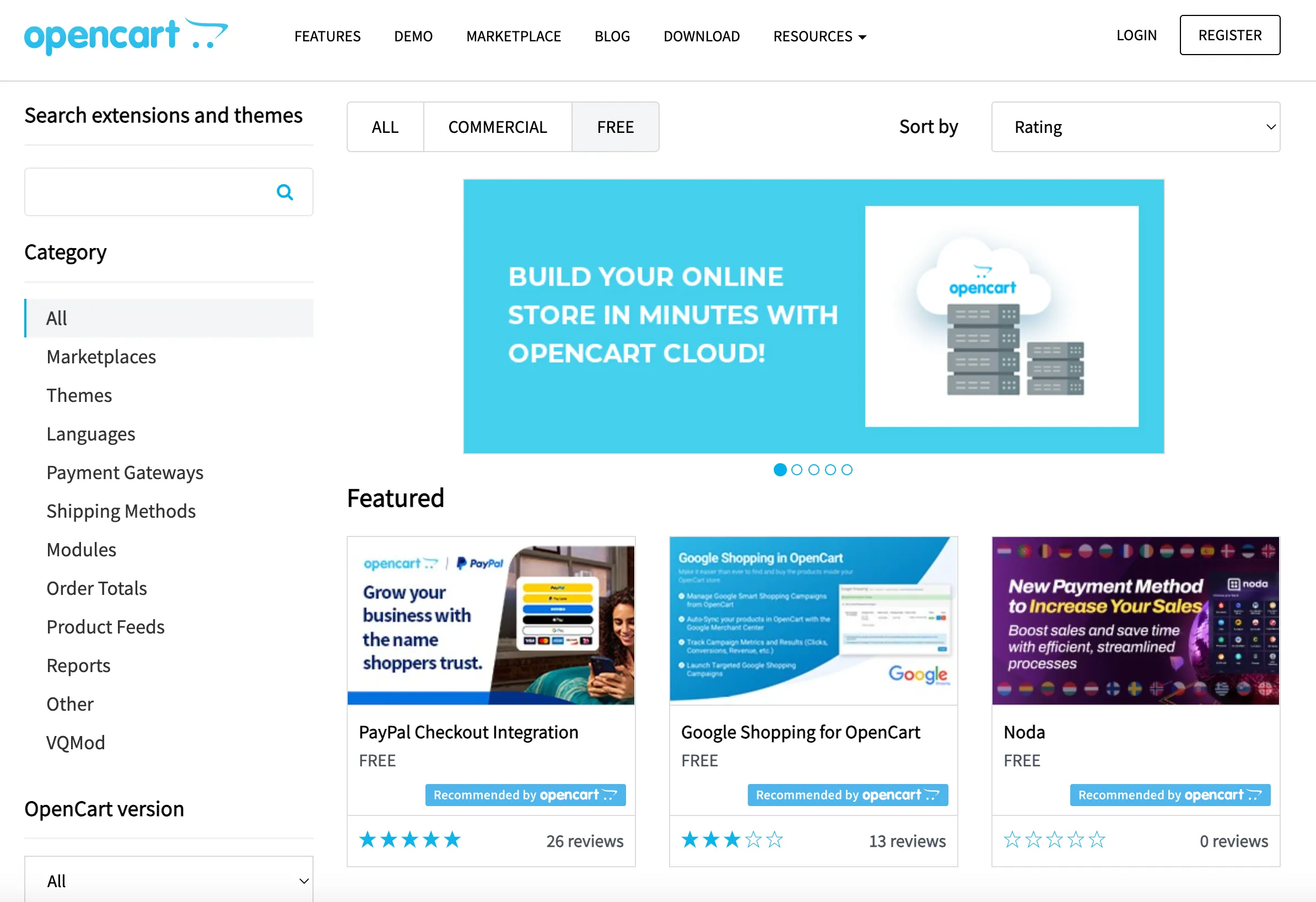
A plus for OpenCart over Shopify is that the majority of extensions are made for eCommerce. If you choose OpenCart for your e-store, it’ll bring a huge benefit since all of these apps directly support your work.
More than that, you can use your coding skills to create custom fields that combine with the extensions. This gives you unlimited customization possibilities to develop a powerful website.
Shopify Apps
Shopify is famous for its huge number of apps available (over 8,000 apps). More specifically, these apps not only contribute a specific purpose to your store but also make it connect to another tool (like Xero or Zendesk). As a result, this wide range of apps is one of the considerable justifications that make Shopify a robust eCommerce platform.
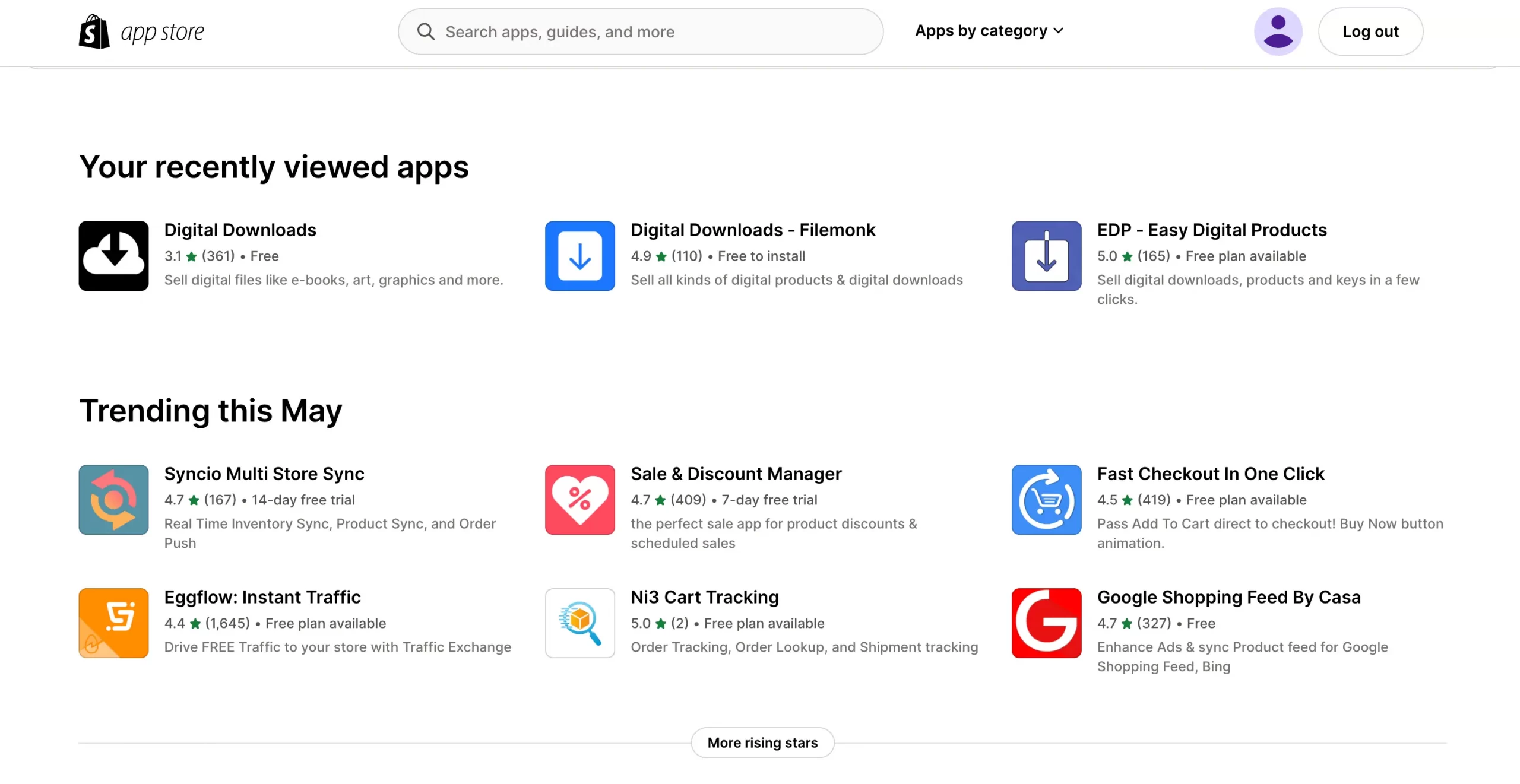
The bright side of having such a massive app store is that you have a lot of options in regards to adding functionality to your store or integrating it with other tools. However, Shopify tends to provide apps and add-ons for simple and popular functionalities such as AMP or drag-and-drop page builder instead of including them in your built-in feature. As a result, it may cost you more money for an extension.
The verdict: OpenCart is definitely better for extensions. In general, OpenCart’s extension is cheaper than Shopify. It not only has more tools for your store but also grants you the opportunity to use custom code to increase your site ability.
#6. Payment
OpenCart Payment
The OpenCart package brings a variety of payment methods, from bank transfers to online payment gateways. It integrates with 51 payment methods including 2Checkout, PayPal, Amazon Pay, Alipay Pay… Furthermore, additional payment methods can be easily installed from the OpenCart Marketplace.
Shopify Payment
Basically, Shopify gives you some payment options:
- Shopify Payments – the in-house gateway from Shopify that can narrow down the transaction fees. To use Shopify Payments, your country must be included in the list of supported countries.
- 100+ third-party providers such as PayPal or Amazon Pay…. that may charge you additional fees per transaction.
You might also want to accept alternative methods of payment, like cryptocurrency. However, there will be an additional fee for each of your transactions.
The verdict: OpenCart won this battle for the variety of payment options as well as charge-free payment. With Shopify, you will need to pay transaction fees for each of your sales.
Make Your Migration Project A Breeze with LitExtension
Don’t have time to manually migrate from Shopify to OpenCart? Let LitExtension lift the burden off your shoulder with our top-of-the-class migration service. Enjoy a streamlined and secure data transfer process with no technical skill required!
#7. SEO
SEO (Search engine optimization) is the process of boosting your website’s ranking on search engines. There’s no doubt that a high position in search result pages brings you more traffic and helps your sales to grow. Therefore, choosing a site builder that provides great support for your SEO is critical.
Let’s continue the fight between OpenCart vs Shopify by examining the SEO aspects.
OpenCart SEO
On the other hand, OpenCart is developed to enhance eCommerce businesses in general. This open-source website builder doesn’t provide a lot of SEO support.

OpenCart just delivers users basic SEO features like editing the meta tags, adding 301 referrals, and rel-canonical with a bit of PHP coding.
On the bright side, with over 14,000 extensions available on the OpenCart Extension Store, installing additional SEO plugins would be a great solution to boost your store ranking positions. Also, you can use our SEO tips to better optimize your SEO performance.
Shopify SEO
Shopify’s primary purpose is to serve the online store’s owners. If your main focus is eCommerce, Shopify is the best for you. With that being said, the SEO features of Shopify are excellent for your e-store.
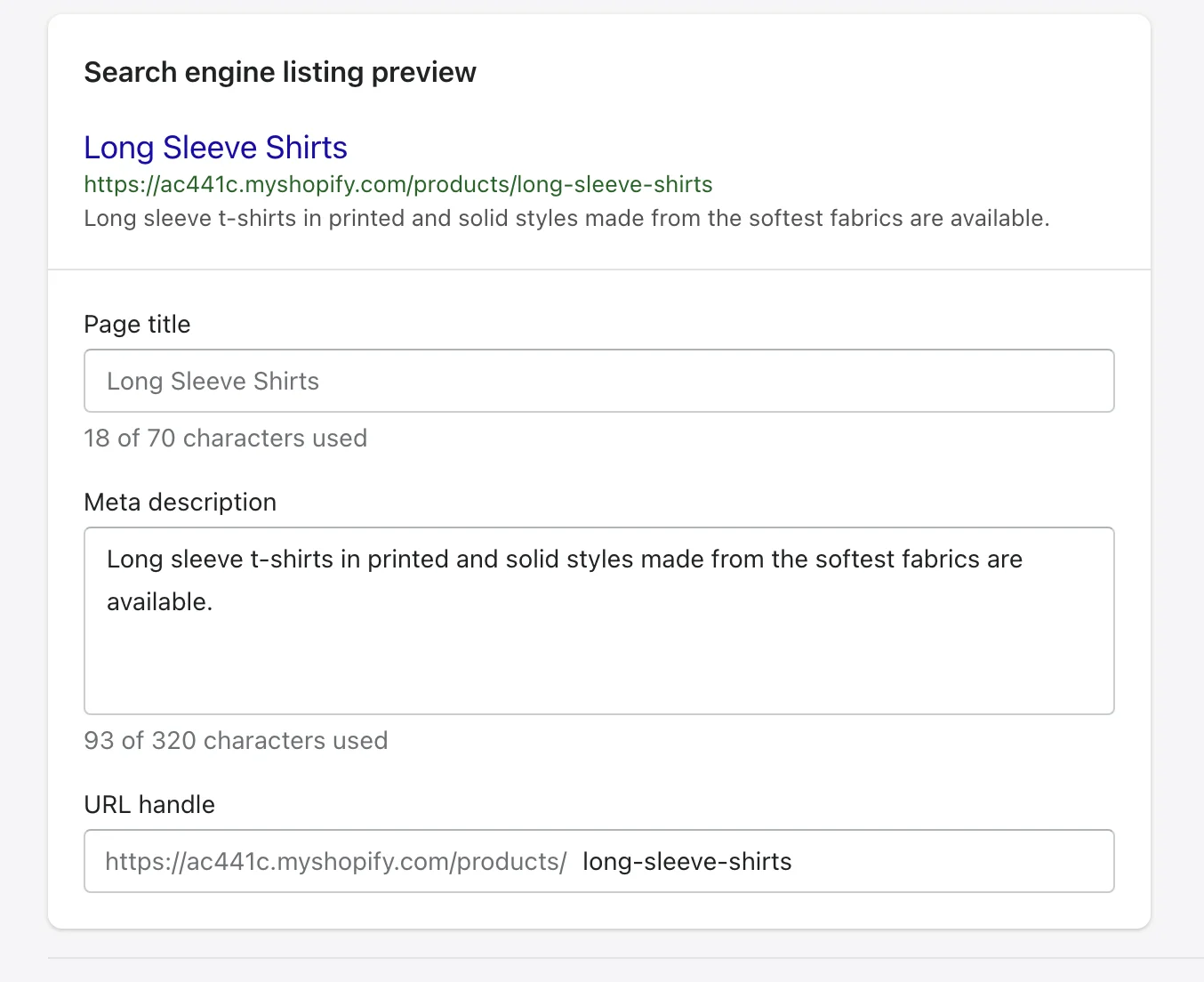
Along with basic SEO features such as meta titles, meta descriptions, responsive capability, and so on, a big benefit Shopify gives you is the ability to self-arrange your site’s category. Thus, this gives you the opportunity to make a logical, easy-to-navigate site structure that will help you gain more SEO points as well as increase customer experience.
The verdict: We mark Shopify is the winner of the SEO battle. OpenCart is not a good option for newbies who expect advanced SEO solutions.
#8. Security
OpenCart vs Shopify, there are always chances that your store might face difficult dilemmas of security risks. In one way or another, your website will need safeguarding to avoid getting attacked and leaking information.
OpenCart Security
Using an open-source platform such as OpenCart which requires attempting to set up and secure your own store. OpenCart is not responsible for protecting your website. Therefore, there are several tasks you need to take to ensure the security of your shops, such as directory and folder protection and file permission.
For instance, enabling SSL for your OpenCart website and admin panel is necessary too. Therefore, it can prevent your data from being stolen when transferred back and forth by any middleman. You can activate the SSL or HTTPS by navigating to Settings → Server → Hit “Yes” at the option “Use SSL”.
Shopify Security
On the other hand, Shopify offers users a lot of security solutions for their stores, their customers as well as their finance. This is one of the main benefits of Shopify vs self-hosted solutions.
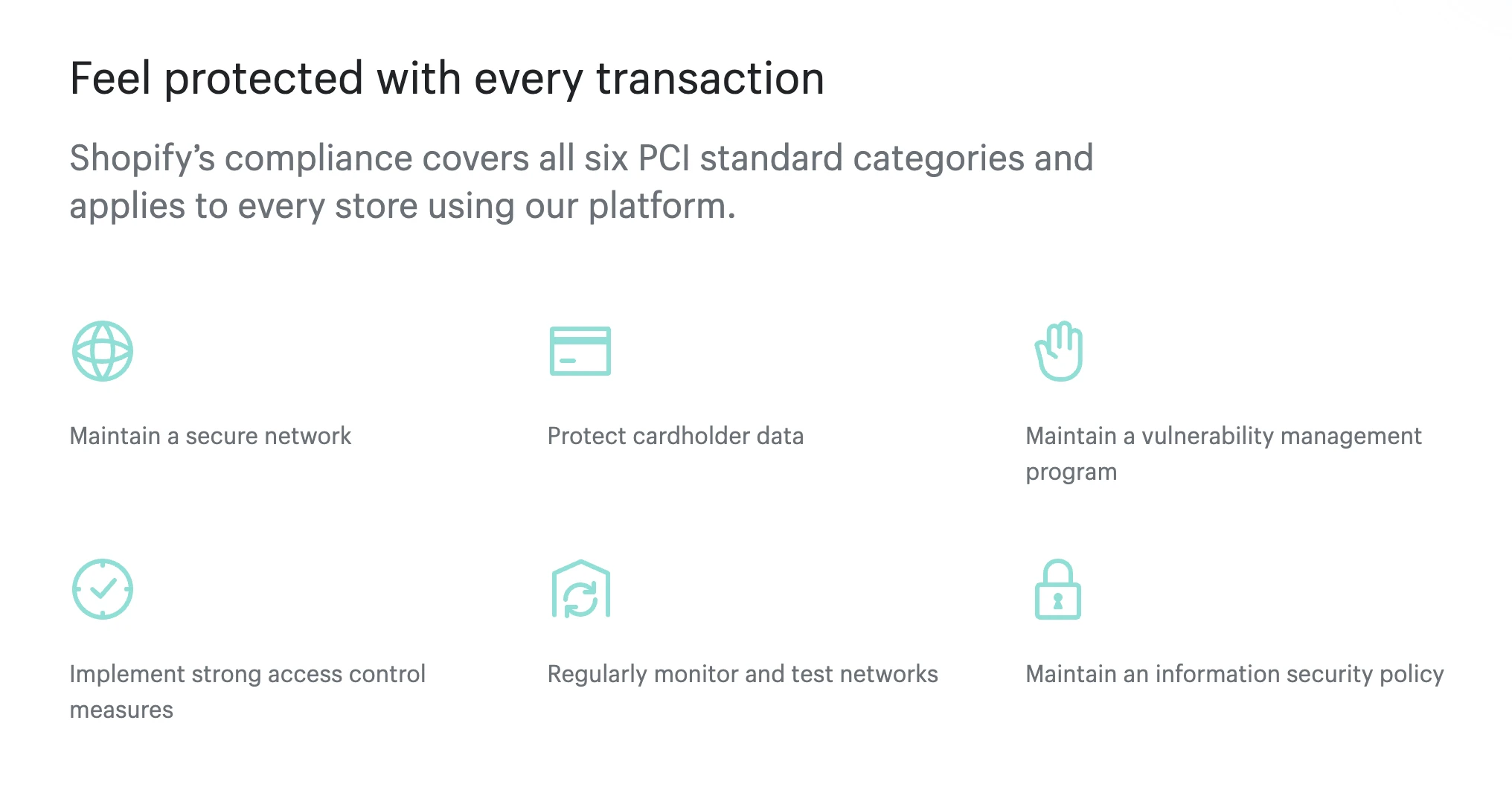
Shopify is PCI level 1 compliant for credit card processing, which means it follows the highest standards of server compliance and provides PCI compliance to protect payment processing.
Secondly, this leading SAAS platform also helps you to keep your customer data from harm by the GDPR (General Data Protection Regulation). This process will limit the login attempts and make sure app developers can only reach the data they need to.
Lastly, a fraud protection system will flag potentially fraudulent orders so that you can review them before processing them. An order has been flagged which means there might be a risk waiting for you. Thus, you can manually check this while fulfilling the order.
The verdict: Shopify as a hosted cart gives you much more convenience for protecting your website. With OpenCart, you will need to put a lot of effort into creating a security system.
#9. Support
OpenCart Support
In fact, any merchants prefer a hosted cart over an open cart for customer support. Apparently, customer service is nonexistent with most open-source solutions.
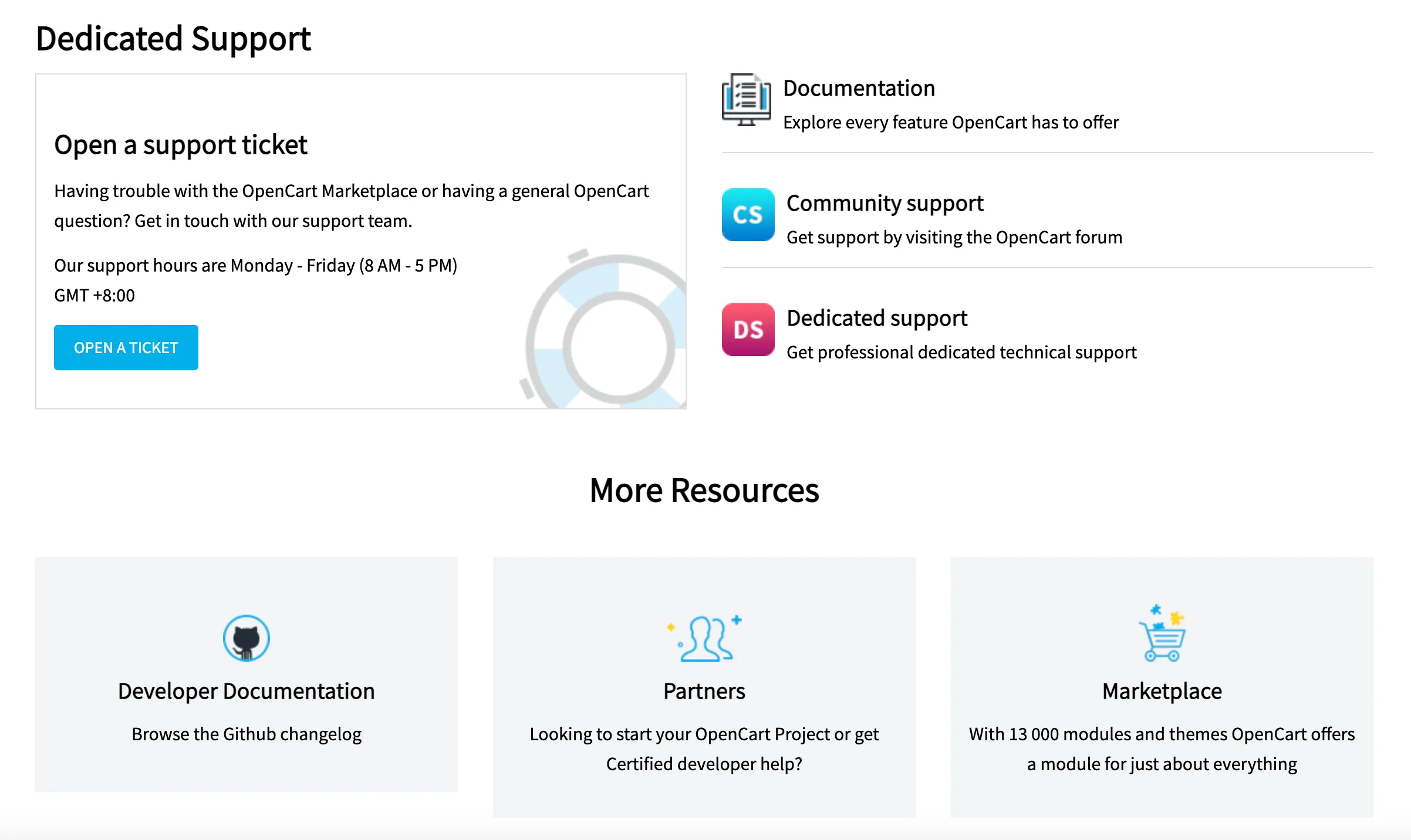
OpenCart has 4 types of support:
- Support ticket: you submit a ticket for general questions (support time: Monday – Friday on a workday)
- Help docs: all the docs for your store management
- Community support: a community forum that allows everybody to share their knowledge and experience in running an online business
- Enterprise support: which may cost from $10 to $300
Shopify Support
As a hosted eCommerce platform, Shopify gives its customers complete support. In addition, you can even hire a special support team for your store. Currently, Shopify offers these support channels:
- 24/7 phone support and live chat support
- Social media support
- Community forum
- Email support
- Help Center
- Video tutorials
- Advanced specialist support
The verdict: Apparently, Shopify provides better support for your store. For OpenCart, you need to find your own support on the OpenCart forum or make use of a paid service to get the assistance you need.
OpenCart vs Shopify: Which One Is Best for Your Business?
So we’ve just analyzed the difference between the two dominant eCommerce platforms, OpenCart vs Shopify in important features. Each platform has its pros and cons, so between OpenCart vs Shopify, which one is best for you? It greatly depends on the needs of your business.
On the one hand, OpenCart is more suitable for small and medium businesses. It’s free to install and gives you a high level of customization, ease of use, and a myriad of extension choices for eCommerce. If you are tech-savvy and appreciate the use of your coding skills, OpenCart is definitely an excellent pick…
On the other hand, Shopify fits all kinds of businesses, from small to large-sized. This hosted cart has superb SEO features, a user-friendliness interface, a high level of security, and great support. If you are not confident with your technical skills and need a full-package service for your store, go for Shopify.
Further reading: Best Shopify alternatives – 16+ free & paid options for your concerns.
OpenCart vs Shopify – FAQs
[sp_easyaccordion id=”71045″]
Final Words
Finally, if you are unhappy with your current site builder and decide to move to another platform that is best suited to your store, it’s time for a migration.
Assuming that you intend to re-platform your current website from OpenCart to Shopify or Shopify to OpenCart, feel free to contact LitExtension – #1 Shopping Cart Migration Expert that helps you to transfer all your data, including products, customers, orders, and other data from one platform to another in just a few clicks.
Don’t forget to check out our blog and join our Facebook Community to get more tips and news.
Good luck!